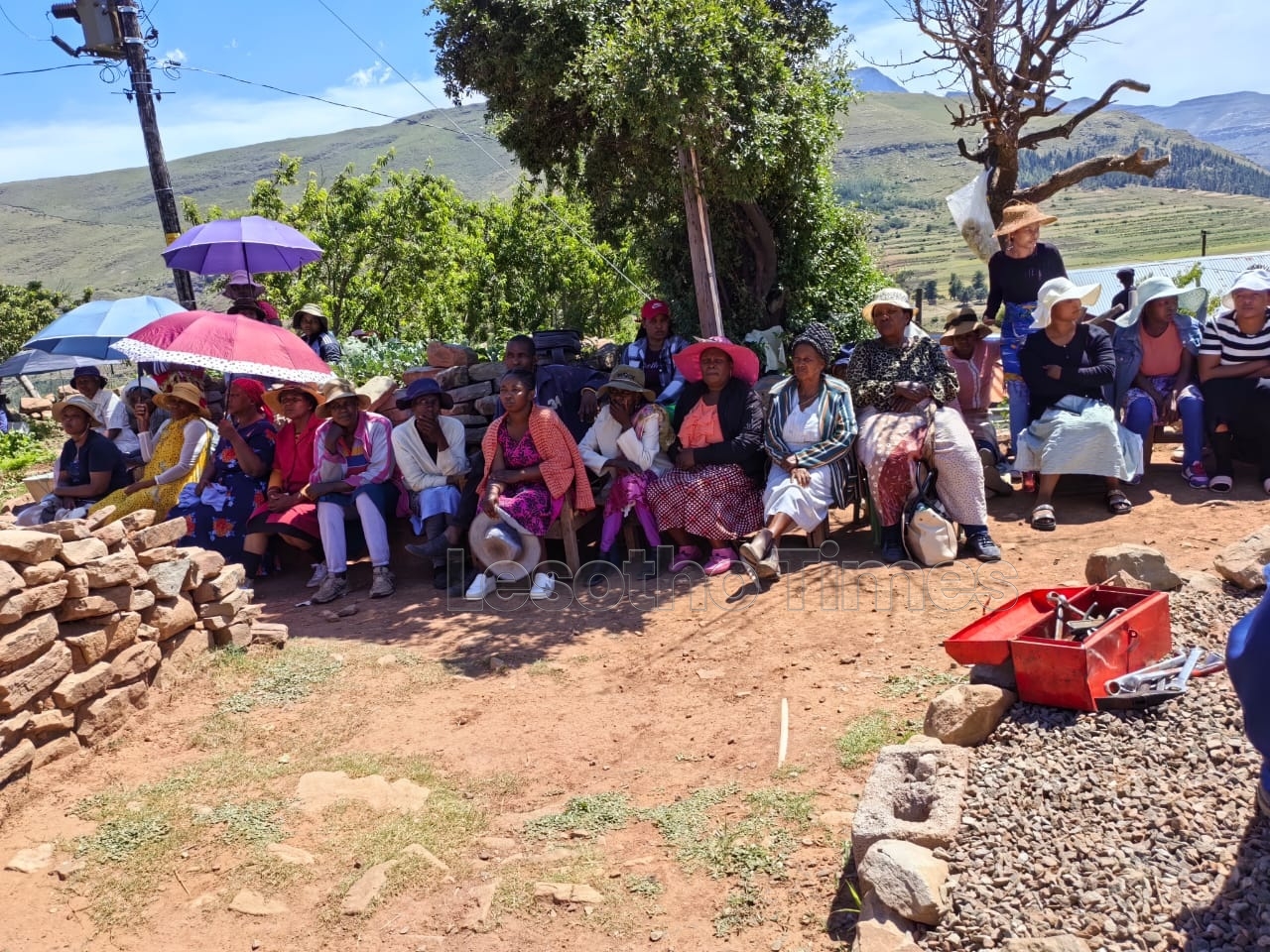Mathatisi Sebusi
THE Ha Nosi community in Qacha’s Nek is bracing for severe food insecurity as extreme heat continues to ravage the district and the rest of the country, leading to devastating harvest losses.
Ha Nosi residents, who depend on farming for both consumption and income, are grappling with the reality of losing yet another season’s harvest.
These concerns were raised during the Improving Adaptive Capacity of Vulnerable and Food Insecure Populations in Lesotho (IACOV) outreach program. This four-year, M150 million initiative, funded by the Adaptation Fund, is being executed by the government of Lesotho through the Ministry of Forestry, Range, and Soil Conservation, and the Lesotho Meteorological Services (LMS), with implementation support from the World Food Programme (WFP).
The country has experienced intense heat for months, with temperatures recently spiking to alarming levels. The LMS issued a warning of a heatwave expected to persist from this past Sunday to yesterday.
“Hot to very hot temperatures are anticipated, with maximum temperatures ranging between 33°C and 36°C in the lowlands and above 30°C in some highland areas. Temperatures are expected to ease slightly on Thursday (today),” the LMS statement read.
Speaking to the Lesotho Times, Chieftainess ‘Makhotso Mabote of Ha Nosi expressed her community’s distress over the impending hunger.
“Our community relies entirely on farming for food and income to meet basic needs, including education for our children. Last year’s harvest was already poor, and we had hoped for a better season this year, but the situation has worsened,” Chieftainess Mabote said.
Many farmers, she explained, were unable to plant crops due to the drought, while those who managed to plant faced devastation from extreme heat and infestations of unusual insects.
“We planted maize, sorghum, and beans, but the sun has burned them all. Even vegetables have withered. We are already struggling to feed our families, and more children are dropping out of school because we cannot afford their fees.”
Twenty-six-year-old farmer Lebohang Makatjane shared his plight, explaining that he had previously supported his siblings with income from farming vegetables but this year, his crops were destroyed. Despite his efforts to water them, they were scorched by the sun and ravaged by pests.
“I don’t know how we will survive,” Mr Makatjane said.
IACOV Communications Officer, Rorisang Kurubully, explained that the IACOV project aims to address barriers to climate change adaptation by enhancing the government’s capacity for early warning systems and ensuring that climate information is effectively tailored to meet community needs.
“The project is three-pronged, with component one focusing on strengthening government capacity to generate climate information and promote its use to forecast risks of climate shocks, mobilise early actions, and co-develop tailored and locally relevant climate services for communities.
“Component two concentrates on raising awareness of communities, women, youth, people living with HIV, and other vulnerable groups on the impacts of climate change, the importance of adaptation, and the use of climate information for seasonal planning and climate risk management.
“And component three focuses on empowering communities to understand community-based planning processes that facilitate implementation of appropriate resilience-building and adaptation interventions that generate sustainable assets, ensuring income diversification and market access,” Ms Kurubully said.
The Ministry of Agriculture, Food Security, and Nutrition representative, Mampoi Mokone, emphasised the importance of farmers aligning their activities with weather forecasts.
“Being aware of anticipated weather conditions will enable farmers to make informed decisions regarding seeds, soil, and the location of their fields. Before you can even buy seeds, be informed of the anticipated weather conditions. This will help you not only to choose seeds that will withstand the anticipated weather conditions but will also help you choose the location and soil of the fields to plough,” Ms Mokone advised.
She also addressed the growing threat of pest infestations, saying, “Invasion of insects into agricultural produce is common in the lowlands and has now invaded Qacha’s Nek.” Mokone encouraged farmers to inspect their crops regularly to catch infestations early, preventing pests from overtaking entire fields or gardens.
She further discouraged the use of harmful pesticides, adding, “I encourage the use of organic medicine to kill insects on agricultural products instead of dangerous pesticides.”
National Climate Change Committee Deputy Chairperson, Mofihli Phaqane, attributed the extreme weather conditions, including the current heatwave, to global climate change. He explained that emissions from industries and unsustainable practices such as deforestation and grass burning contribute significantly to the crisis.
Mr Phaqane urged communities to protect the environment, avoid emitting harmful gases, and rehabilitate degraded areas.
“Climate change is not just a local issue—it’s a global challenge. Understanding its causes will help us implement effective mitigation and resilience strategies,” Mr Phaqane said.
The IACOV project has so far reached Berea, Leribe, and Qacha’s Nek, and is expected to extend its outreach to all ten districts of Lesotho. For the Ha Nosi community, the lessons from this initiative could offer a glimmer of hope amidst the mounting challenges posed by climate change and food insecurity.

